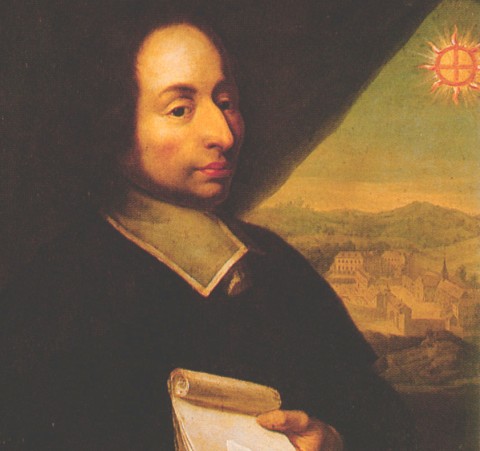Blaise Pascal, blessed doubter
Pascal knew both the inconstancy of the human heart and the promise that we were made for glory.

Readers of the Italian newspaper La Repubblica have been following a series of freewheeling conversations between Pope Francis and Eugenio Scalfari, the paper’s founder and a celebrated atheist now in his nineties. At the end of a 2013 interview, Scalfari expressed the wish that the pontiff would someday share his thoughts on “that great soul,” 17th-century philosopher Blaise Pascal. In their most recent conversation, published on July 8, 2017, Pope Francis obliged. Pascal is a great soul indeed, said Francis, and deserves to be counted among the blessed. Accordingly he announced his plan to request a formal study of Pascal’s cause for beatification—which is remarkable on the part of this Jesuit pope, considering the ferocity of Pascal’s anti-Jesuit writings.
Should Pascal be beatified? Whatever else he may have been, he was certainly a genius. This is the prodigy who at age 11 was reputed to have discovered for himself the first 32 of Euclid’s propositions; who in his teenage years invented the first calculating machine to ease his father’s accounting chores; who in his twenties devised a series of experimental tests to confirm, against the scientific orthodoxy of his day, the existence of the vacuum; who, at the instigation of his gambling buddies and in correspondence with Fermat, laid the foundation for the modern theory of probability; who was an inspiration for the development of calculus, decision theory, and fluid mechanics; and who in the last year of his life invented the world’s first system of public transportation, designating profits to go to the poor.
Read our latest issue or browse back issues.
Surely there is something divine in such an extraordinary scientific career. We could imagine, alongside the “holy fools” of Eastern Christian hagiography, a class of saints of the intellect who dedicate their gifts to the glory of God and the good of humanity rather than to the inflation of their own egos. Scientia inflat, as the saying from St. Paul goes, caritas vero aedificat—science puffs up, love builds up—but the scientist whose heart is transfixed by love is a wonderful thing. And Pascal’s heart was transfixed by love, as we know from the written record of his “night of fire” found after his death sewn into the lining of his coat.
Pascal had been at home in the most refined intellectual circles, though his nervous and sickly constitution meant that he would never find unalloyed pleasure in such activities. Reading Montaigne and Augustine (through a Jansenist lens) instilled in Pascal a double skepticism about human moral and scientific projects. In the Pensées—fragments of an apologetic work left unfinished at his death—Pascal’s constant theme is the inconstancy of the human heart. He exposes the malaise that our Internet age merely amplifies: “Take away their diversion [read “take away their smartphones”] and you will see them bored to extinction.” The trackless, mind-boggling infinities revealed by the new science, the catastrophe of original sin, the frailties and fatalities that consume our brief life span—these are the sobering subjects with which his meditations begin. Perhaps if there is room for Ecclesiastes in the scriptural canon, there is room for such a latter-day Kohelet among the canonized saints.
But the Pensées are not all dust and depravity. The Jansenist turn of Pascal’s thought did not deter him from finding traces of enduring nobility: “Man transcends man.” The dust-and-depravity rhetoric is a “counterweight” to the exalted promise that we were made for glory. Even the spiked belt Pascal wore next to his skin was a homing device to train his sights on eternal happiness.
Though Pascal believed a compelling case for Christianity could be made by appeal to history, prophecy, and miracles—with his famous “wager” argument a logical accessory—his apologetic project is founded on the quintessentially modern sense of being lost in the cosmos rather than on theoretical reasoning. As T. S. Eliot once said, Pascal is the evangelist to “those who doubt, but who have the mind to conceive, and the sensibility to feel, the disorder, the futility, the meaninglessness, the mystery of life and suffering, and who can only find peace through a satisfaction of the whole being.”
Pascal looked into the abyss and found that peace. The “night of fire” inspired him to soften his irritable temper, suppress his competitive zeal, step up his works of charity, submit to his chronic illness, and prepare for a holy death.
During the same week in which he gave his recent interview to La Repubblica, Pope Francis issued an Apostolic Letter adding a new path toward canonized sainthood for Christians who “have voluntarily and freely offered their life for others and persevered with this determination unto death,” especially when that death is premature.
It’s tempting to think that this new category was on the pope’s mind when he spoke of beatifying Pascal, whose death at 39 was premature and, in a spiritual sense, freely given. Francis was deeply moved by Pascal’s resolve to spend his last days in the company of the destitute, receiving identical care. Whether the process takes this new pathway or the more well-worn road of “heroic virtues,” Pascal may never be a perfect fit; he is sui generis. Beatified or not, he deserves to be remembered with a prayer whenever we look out at the night sky, or place a bet, or use a computer, or ride a bus, or consider our end.
A version of this article appears in the August 30 print edition under the title “Blaise Pascal, blessed doubter.”





